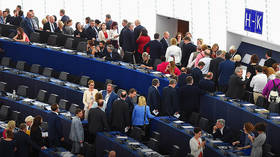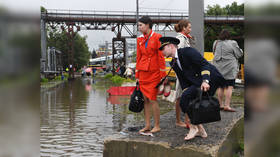EU choices for top posts a reflection of policies that led to its current mess

In spite of everything that has happened in the EU in the last five years, its member states contrived to select four politicians who embody total continuity with all the policies that led the EU into this mess in the first place.
None of the recent calamities have persuaded the bloc to even slightly alter its course. Not the rise of anti-system parties in Italy, Germany, France, Finland and elsewhere. Not the rise of patriotic forces in Poland and Hungary. And not Brexit, which in economic terms is equivalent to the loss of not one member state but 20, and which will destroy the current EU budget arrangements.
The four men and women whose appointments were hammered out on Tuesday are all determined to create a “United States of Europe” (to quote the future new president of the European Commission, Ursula von der Leyen) and therefore to proceed with the very same European integration which is causing so much internal stress in EU member states and its institutions. Moreover, three of the four come from the core EU states, the original founder members in 1951, with no one from the “new Europe” in Eastern or Central Europe. It is as if, in this time of deep crisis, the EU wanted to return to its sources from nearly 70 years ago, instead of re-inventing itself afresh to face the new challenges of the 21st century.
The most striking announcement is of course that of the top job, the German Defence Minister Ursula von der Leyen as Commission president. Because the Commission has a monopoly over the whole legislative and executive process in the EU institutions, this body is the motor which drives the whole machine. The parliament, by comparison, is powerless. The fact that Germany has now acquired control of the most important EU institution is remarkable, not least because it is the first time a German has held this post since the very first Commission president, Walter Hallstein, who had the job between 1958 and 1967. In the intervening decades, and especially since 1990, Germany has emerged as the hegemonic power in the EU and nothing is decided in Brussels without Berlin’s agreement.
Also on rt.com Von der Leyen & Lagarde: Does ANYONE expect them to change neo-liberal status quo?Germany also dominates the European Parliament: four out of the seven groups in the parliament, and therefore over two-thirds of the members, are led by Germans. As Angela Merkel prepares to leave office in Berlin, therefore, she can be sure that her legacy will live on, and indeed increase, in Brussels and Strasbourg, where the EU institutions will be controlled by her closest political allies and heirs.
Ursula von der Leyen’s specific contribution, apart from her nationality and her status as a close ally of Angela Merkel, is that she is a committed supporter not only of the concept of a federal Europe but also of an EU army. As defense minister, she previously announced plans to invest €130 billion in Germany’s military over 15 years, and a 10 percent increase in 2019 to bring it up to €50 billion a year. If this re-militarization is dressed up in “European” clothes, then Cold War tensions on the European continent will only rise, something Mrs von der Leyen clearly wants: she is notorious for being one of the worst anti-Russian hawks in Germany and Europe.
Things are hardly better with the least important of the four nominations, that of Josep Borrell as foreign policy chief. Just as von der Leyen has said that Russia is no longer a partner, so Borrell described Russia as “an old enemy” in May: Russia summoned the Spanish ambassador in Moscow to the Foreign Ministry to protest. Borrell shares with von der Leyen a dogmatic yet self-contradictory belief in a “European defense compatible with Nato”: Nato is in reality dominated by the United States. And although he has been critical of the attempt by the US government to force regime change in Caracas, Borrell nonetheless supports the “recognition” of Juan Guaido as president of Venezuela: like his position on defense, this halfway house is also self-contradictory because if Guaido really were the legal president of Venezuela, as Borrell claims, then the young US puppet would have every right to remove Nicolas Maduro by force.
Also on rt.com Good luck to EU: Bundeswehr crumbled under von der Leyen, who is now to take helm of the unionCharles Michel, the new president of the European Council, is the second Belgian to have occupied this essentially honorific post: Herman van Rompuy was appointed as the first president in 2009. (The second was Donald Tusk; Michel is the third.) It is often said of Belgium that it has seven parliaments but no state: now Michel will have 27 governments but still no state. It would be difficult to imagine a more conformist politician than Charles Michel: this born liberal has never uttered an original word in his life. Moreover, like Ursula von der Leyen, he has EU politics in his blood. Like Ernst Albrecht, Ursula von der Leyen’s father, who was a senior official at the European Commission before he became minister president of Lower Saxony (Ursula was born in Brussels and went to the European School), Charles Michel’s father, Louis, was a Belgian foreign minister and European commissioner. Two out of yesterday’s four appointments are therefore dynastic, emphasizing the caste-like European political class, to which one should perhaps add Josep Borrell who is a former president of the European Parliament and a former president of the European University Institute in Florence.
In short, none of the four shines as a personality while several of them have been embroiled in financial scandals – Borrell for failing to declare a €300,000 a year consultancy job in 2012 and Lagarde for approving a state payout to a friend of Nicolas Sarkozy. Leyen has often been accused of incompetence as a minister, more concerned with her perfect hairdo than with running the German Army. All four have survived in politics, in most cases for decades, precisely because they have never deviated from the party line and have instead got where they are by doing as they are told.
As for the man elected president of the European Parliament on Wednesday, he has no power at all. What little power the European Parliament has is vested in its members. David-Maria Sassoli’s election drives a further nail into the coffin of the principle of political representation because he represents a spent force in Italian politics. As a member of the Democratic Party, he stands for the old order which was swept away in Rome in 2018 when the new-left 5 Stars and new-right League built an alliance to thrust aside the old parties. Above all, Sassoli was vice-president in the previous parliament and therefore his election now is also an expression of continuity.
In short, faced with an existential crisis and a severe lack of credibility, the EU’s message to its voters and the world is: Business as usual.
Think your friends would be interested? Share this story!
The statements, views and opinions expressed in this column are solely those of the author and do not necessarily represent those of RT.















